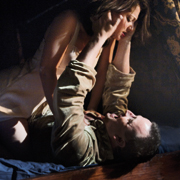[10.10.2012] When Torsten Rasch’s opera The Duchess of Malfi was first staged in 2010 by English National Opera and innovative theatre company Punchdrunk, it sold out within hours and was heralded as ‘electrifying’, ‘glorious’, and ‘a candidate for a six-star review’. Now German audiences will have their own chance to experience this extraordinary work when the opera receives its German premiere at the Chemnitz Opera House on 23 March 2013.
The opera is based on the original play The Duchess of Malfi by John Webster. The tragic, blood-soaked tale is set in 15th-century Amalfi where the young widowed Duchess of Malfi falls in love with her steward and gives him her hand in marriage. They struggle to keep their relationship secret, especially in front of her two brothers who strongly opposed the Duchess remarrying beneath her station. Soon the brothers become suspicious and do everything possible to restore the family honor.
Rasch’s dark, rich music perfectly reflects the tortured drama. He uses a large orchestra and a cast of five singers including The Duchess, who will be sung in Chemnitz by mezzo Tiina Penttinen and Ferdinand sung by the counter-tenor Hagen Matzeit. The drama will be brought to life in a new production by the famous director Dietrich Hilsdorf and this will be the first time that the opera will be performed in its complete, re-ordered form.
As the composer explains:
‘the intention of the original Punchdrunk production [staged in different rooms of a warehouse] was to have an opera which gave them the freedom to explore ideas in a very special fashion. However, from the very beginning I thought of The Duchess of Malfi as an opera which would eventually be produced on a 'normal' stage with the orchestra in the pit. The compromises I had to make to make in the first production are mainly based in the orchestration, which on the other hand made it possible to give every scene a specific and unique colour. So in most parts of the new complete opera I kept the original orchestration intact. I have also added my 'original' ending which was not possible to use in London for staging reasons.’
At the Chemnitz performance Frank Beerman will conduct the Robert Schumann Philharmonie.
The same orchestra will also perform a new concert suite from the opera, entitled The House of Temperaments, in Chemnitz on 17 & 18 April. ‘The suite,’ says Rasch, ‘is based on John Webster's idea of modeling the main characters of his play after the 4 humors or temperaments (the Duchess: sanguine, Ferdinand: choleric, Bosola: melancholic and the Cardinal: phlegmatic). There is an introduction and 4 movements, each depicting one of the characters using themes from the opera.’
Four scenes from the opera have also been adapted for performance by counter-tenor and piano. Entitled Ferdinand Dreams…, the newly arranged extracts explore the psyche of Ferdinand, the play’s most twisted and psychotic character. In the assembled songs Rasch has arranged parts of Ferdinand’s scenes which highlight his extreme emotional diversity, as well as composing new imaginary scenes. ‘The result’, says Rasch, ‘is the feeling of jumping from one extreme to the other just as somebody like Ferdinand might experience them in a dream.’ The songs are dedicated to counter-tenor Andrew Watts who sung the part of Ferdinand in London, and who will perform them with pianist Volker Krafft at Vienna’s Casino Baumgarten on 24 October.
Sonia Stevenson



